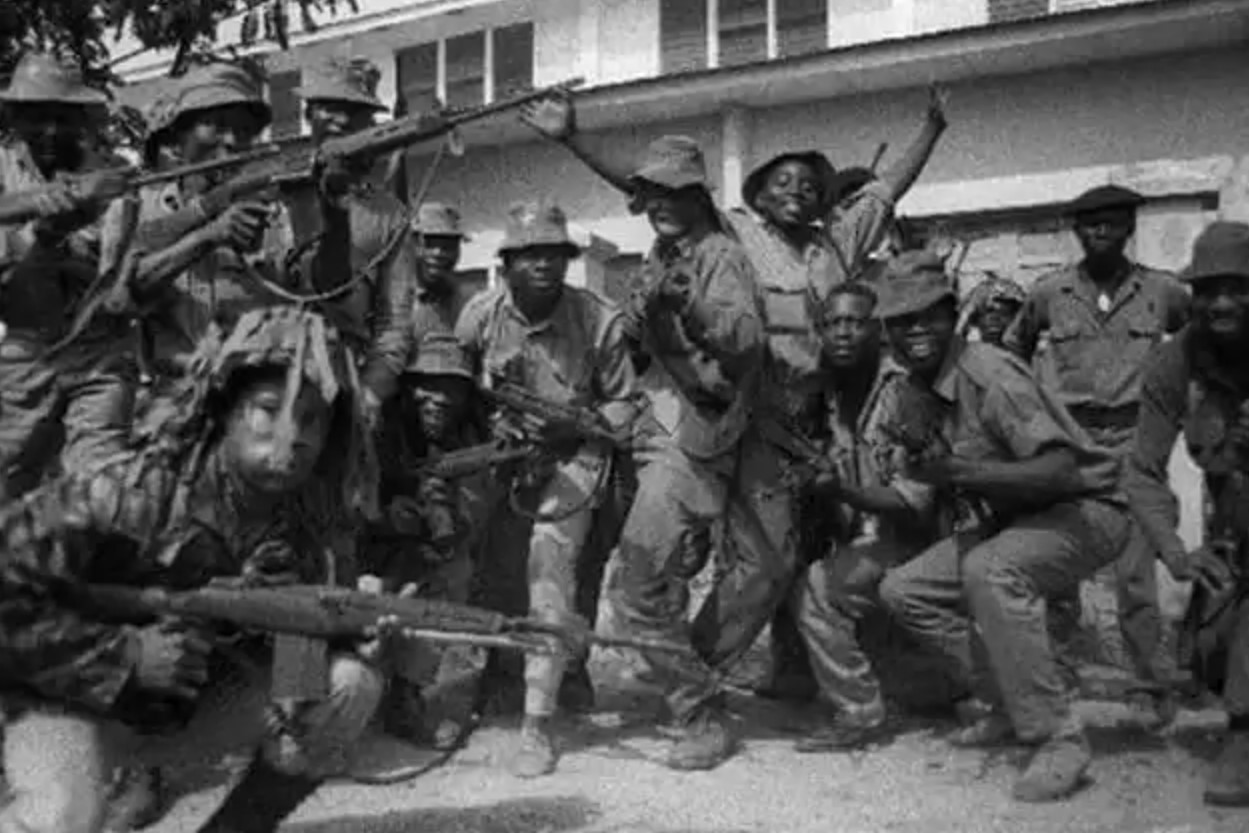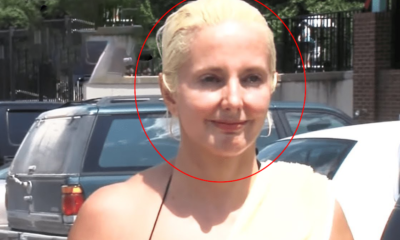| Nickname, Slogan, Local Name or Operational Name |
Definition/Meaning |
| A |
| Agbekoya |
Yoruba term for “old peasant farmer.” The tax revolt of the “old farmers” proved to be a serious internal security issue during the war. |
| “Ahiara” Declaration |
Modelled after Tanzania’s Arusha declaration, Ojukwu issued this ‘Biafran revolutionary’ declaration on June 1st, 1969 ostensibly to address nepotism and corruption within the Biafran military and society. |
| “Air Raid” |
Nickname for Biafran Colonel Joe Achuzia, acquired during the attempt to retake Okigwe in late 1968. |
| Ojuku soja |
Nickname for Biafran troops among illiterate and semi-illiterate Nigerian soldiers. It stands for “Ojukwu’s soldier.” The term “soja” has entered mainstream use in Nigeria. |
| Alalaba tactics |
Alalaba means “sneaking” in Hausa. Designed by then Major MJ Vatsa, it was an infantry method of tactically gaining ground on a Biafran armoured vehicle before destroying it at close quarters. |
| Annabelle |
Operational code-name for Biafra’s Uli-Ihiala airstrip |
| Apollo Battalion |
This was the nickname given to a 3rd Marine Commando self-contained independent Divisional reserve battalion created by Colonel Obasanjo after the landing of Apollo 11 on the moon in July 1969. It was used in a “fire brigade” role as a “special forces” raiding unit. It was, therefore, similar to Ojukwu’s “Umuahia Brigade” and may well have been inspired by it. |
| Araba |
Araba in Hausa means to separate. The term first appeared on placards carried by rioters in Bauchi in May 1966 after the promulgation of the ill-advised Unification decree #34. That is why the May riots, which quickly spread to other towns in the north, are sometimes called the araba riots. |
| Atomati |
Nickname for “automatic weapon” among illiterate Nigerian soldiers. |
| B |
| “Baba” |
Used fondly, this was the nickname for Lt. Col. David Ogunewe, the last Commander of the 1st battalion in Enugu before the outbreak of the war. He played a critical role in containing tension between northern and eastern soldiers during the July 29 northern counter-coup. |
| “Basha” |
Federal Nigerian nickname for temporary makeshift billets (tents) constructed for troops using zinc sheets or tarpaulin. The term survived the war and is still in use. |
| “Biafra Gin” |
Homemade Biafran Incendiary weapon produced by the Chemicals and Materials Workshop subsequently subsumed under the Research and Production (RAP) Organization. Used against federal personnel, defensive positions and armoured vehicles. |
| ‘Black Eagle’ |
Nickname for Colonel Hubert Julian (Biafran mercenary) |
| ‘Black Jack’ |
Nickname for Col. Jean Schramone (Biafran mercenary) |
| ‘Black Scorpion’ |
Nickname conferred by foreign correspondents on Colonel Benjamin Adekunle, Commander of the Federal 3rd Marine Commando Division |
| “BOFF” |
Acronym for Biafran Organization of Freedom Fighters. Colonel Aghanya led it. |
| ‘Boozy Bonzo Bond’ |
Nickname for a South African mercenary who flew jets for the Federal Nigerian AirForce, drank whiskey while flying and liked to fly his aircraft back riddled with bullet holes – as evidence. |
| “Bottoms” |
Residue of Biafran fuel refining process which was then used as fuel oil |
| The “Brave” |
Nickname for Armand Iaranelli, a Corsican mercenary fighting for Biafra |
| C |
| Corporal Nwafor |
Named after the Biafran soldier that captured it, the nickname ‘Corporal Nwafor’ was bequeathed to a federal Nigerian Army Saladin armoured vehicle captured from the federal 2DIV during one of several Biafran attempts to retake Onitsha. ‘Corporal Nwafor’ was recaptured by federal troops of the 3MCDO during the unsuccessful Biafran attempt to retake Ohoba in July 1969. |
| D |
| Exercise Damisa |
Damisa is the Hausa word for “Leopard”. Code-name for the Kaduna component of the January 15, 1966 mutiny |
| Delfin |
Czech L-29 armed fighter jet/trainer used by Federal Nigerian Air Force |
| “Doctor Wise” |
The nickname of a Biafran spiritualist who wielded great (and controversial) influence over military operations, particularly in the latter stages of the war. He was a kind of Rasputin for many elements of the Biafran political and military leadership. The use of juju men and spiritualists was common to both sides during the war and remains a common practice in modern Nigeria. |
| E |
| F |
| “Final Offensive” |
Nigeria launched many unsuccessful “final offensives” during the war until the real final offensive of December 1969/January 1970. The term became an object of scorn on Biafra radio. |
| “FOB” |
Acronym for ‘Forward Operating Base’. This was a term used by the Federal Nigerian Air Force for bases located in Makurdi, Benin, Calabar and Lagos. |
| ‘Foot cutter’ |
A type of homemade Biafran mine |
| G |
| Operation “Giwa” |
Giwa is the Hausa word for elephant. This so-called operation was alleged as the final act in the complete Igbo take-over of the country in 1966 after the execution of Operations Damisa, Kura, and Zaki. The existence of such an operation has never been independently confirmed. Nevertheless, such propaganda was widely disseminated in certain northern circles and may well have been believed. |
| “Genocide” |
Call-sign/code-name for a South African mercenary who flew for Biafra Also the nickname for a homemade Biafran armoured vehicle used during the battles for Ikem and Obollo Eke in 1967. Federal forces destroyed it. |
| “Genocide Squadron” |
Biafran nickname for Federal Nigerian Air Force IL-28 Bombers, converted DC-3s and DC-4s at the Benin City Forward Air Base in the Midwest. |
| “Go on with One Nigeria” |
Federal Nigerian wartime slogan created from the alphabets in GOWON. |
| ‘Good morning’ artillery barrage |
Biafran nickname for highly predictable Federal Nigerian Army harassing artillery fire aimed at nobody in particular, usually the trees and bushes, but occurring at exactly the same times every morning. Used as an “alarm clock” by Biafran units. |
| ‘Gowon’s Boots’ |
Biafran nickname for swelling of both feet caused by Kwashiorkor – resulting from wartime protein malnutrition. |
| ‘Guitar Boy’ |
Nigerian nickname for the Soviet AK-47 automatic rifle. Likely related to the curved shape of its ammunition magazine and the unique sound it makes when switched from full automatic mode to semi-automatic grouped shots of three rounds each. |
| Gwodo-Gwodo |
Biafran nickname for very huge “Nigerian” soldiers suspected (but never confirmed) to be of Chadian origin |
| H |
| ‘Hannibal’ |
Nickname for Biafran Colonel Joe Achuzia, acquired after the Federal Nigerian Army Abagana disaster. Inspired by Carthaginian General Hannibal who defeated Roman troops at Cannae. |
| Lord “Haw-Haw” |
Federal nickname for Okokon Ndem, a minority easterner who nevertheless, worked as a highly effective Biafran radio propagandist. Biafran radio also used the same nickname for Mr. Ukpabi Asika, a pro-federal Igbo intellectual who was appointed on October 27, 1967 by General Gowon as Administrator of the East-Central State. The term dates back to the Second World War. ‘Lord Haw-Haw’ was the name British radio fans called William Joyce, an American born British man with an English mother and Irish-American father. He had nazi sympathies and worked for Goebbels as a German weekly radio broadcaster. The British hanged him for treason in 1946. |
| I |
| ‘Intruder’ |
Biafran nickname for a specific Federal Nigerian Airforce Ilyushin IL-28 Russian bomber based at the Benin City Forward Air Base in the Midwest. By flying at altitudes above 10,000 feet, usually at night, it avoided Biafran ack-ack and homemade ground to air rockets. It was part of the so-called “Genocide Squadron.” The Intruder was destroyed on the ground in May 1969 during Count Von Rosen’s Operation Biafra Baby |
| “Ironside” |
British nickname for Major General JTU Aguiyi-Ironsi, first GOC Nigerian Army and first military Head of State of Nigeria. Killed during the northern counter-coup of July 1966. |
| J |
| “Jack” |
British nickname for General Yakubu Gowon. Derived from YAKUBU. |
| “Jet” 22 |
Federal nickname for the 22 Battalion under Major Abdullai Shelleng in the Nsukka sector of the 1st Infantry Division. The name was acquired on the basis of a sitrep Shelleng sent back to 1DIV HQ stating that he had advanced with “jet speed” after successfully catching up with his fellow 21 and 5 battalions during the drive towards Opi junction. Both sister battalions had originally left him behind in Nsukka while he was awaiting weapons, ammo and support units. |
| “Jet 77” |
Biafran propaganda company attached to the “S” Division when it was under command of Lt. Col. Onwatuegwu. |
| K |
| “Kaduna” |
One of the middle names of Major Patrick Chukwuma “Kaduna” Nzeogwu, leader of northern operations during the January 15, 1966 mutiny. |
| ‘Kamikaze Brown’ |
Nickname for a Czech mercenary pilot called Brown who piloted Biafra’s B-26 bomber until it was destroyed on the ground at Enugu airport. |
| Operation “Kura” |
Kura is the Hausa word for Hyena. This was the alleged Igbo operation to eliminate northern traditional rulers at Ibadan on July 28, 1966, as a follow-up to “Damisa.” The existence of such an operation has never been independently confirmed. Nevertheless, such propaganda was widely disseminated in certain northern circles and may well have been believed. |
| L |
| “Land Army” |
A subgroup of the Biafran “Science Group” dedicated to the production of food under economic blockade. |
| M |
| “Mad Mike” |
Nickname for Col. Mike Hoare (Biafran mercenary) |
| “Marshals” |
Extra-large, homemade, Biafran multiple mine throwers |
| “Monty of the Midwest” |
Drawing inspiration from Britain’s Field Marshall Montgomery of Alamein, this was a nickname for Federal Nigerian Lt. Col. Murtala Mohammed, Commander of the 2nd Infantry Division on account of his successful campaign to contain and evict Biafran forces from that region in 1967. |
| N |
| “Na Cinema” |
Nickname for Colonel Benjamin Adekunle, mainly used among his people, the Yoruba. |
| “Ndidi” |
Biafran nickname meaning “patience.” It was given to a captured Federal Nigerian Army Armored Personnel Carrier at Uzuakoli. |
| “No Victors; No Vanquished” |
Federal Nigerian Wartime slogan, particularly after the war |
| O |
| Ogbunigwe |
Very deadly homemade Biafran multipurpose bomb produced by the Weapons and Equipment Workshop subsequently subsumed under the Research and Production (RAP) Organization. Ogbunigwe was based on the physics of the “Monroe” effect. It killed and maimed by wave effect percussion and dispersal of shrapnel. It was shaped either as a cone or cylinder and could be used as a land mine, a ground to ground projectile against troop concentrations or ground to air anti-personnel “air burst” cluster bomb. |
| “Oguta Boy” |
Biafran nickname for a Nigerian Panhard armoured vehicle captured at Oguta in September 1968. The vehicle was later destroyed using “Alalaba” by elements of the Federal Army 21 Battalion under Major Vatsa during the battle for Uzuakoli in April 1969 |
| Operation ‘Aure’ |
Aure is the Hausa word for “marriage”. When planning for the northern counter-coup of July 1966, conspirators in southern Nigeria made coded reference to it by talking about “Paiko’s wedding”, Paiko being the nickname for (and hometown in Niger Province of) Lt. Garba Dada, a northern subaltern at the 4th battalion who was to be the spearhead. |
| Operation Biafra Baby (Babies) |
Biafran mercenary Count Von Rosen’s Minicon air raids against Federal Nigerian AirForce aircraft at Port Harcourt, Enugu and Benin airports on May 24 and 25, 1969. Later on, raids were carried out against oil and shipping facilities at Port Harcourt, Sapele, Warri and Forcados. |
| Operation Do or Die |
Biafran offensive in late October 1969 to reopen the route to the Otuocha food-producing area between Onitsha and Abagana. This was a direct response to the Federal Operation ‘Finishing Touch’ |
| Operation ‘Finishing Touch’ |
Federal Nigerian Army HQ offensive launched in October 1969 to break the stalemate of ‘trench warfare’ that characterized the preceding months. |
| Operation Hiroshima |
Unsuccessful Biafran offensive to retake Onitsha in November 1968 |
| Operation ‘Kinshasha Special’ |
Alleged coup attempt uncovered on September 21, 1967 against Biafran leader Emeka Ojukwu by Colonel [Brigadier] Banjo, [Major] Alale, Major [Lt. Col.] Ifeajuna and [Major] Sam Agbamuche. All four men were executed within four days after a court-martial. Ojukwu claimed in his diary that Ifeajuna was seen coming out the premises of the British High Commissioner and that Banjo had thousands of pounds given to him by the British, and that British-paid saboteurs were indoctrinating Biafran troops in the trenches. He later accused Banjo of deliberately withdrawing from Benin in the wake of Lt. Col. Mohammed’s 2DIV offensive. |
| Operation Leopard |
Federal Nigerian Army 1st Infantry Division military offensive to take Umuahia in March and April 1969. Umuahia was then the capital of Biafra. |
| Operation Mabel |
French Secret Service airlift operation directed by Jacques Foccart to supply Biafra with weapons (It began in September 1968, after an earlier public declaration on August 1st that France was in support of Biafran “self-determination”) |
| Operation OAU |
Federal Nigerian Army Offensive of September 1968 launched by 3MCDO Commander, Colonel Benjamin Adekunle. Originally announced by Adekunle on July 30 at an international press conference. It was aimed at the near simultaneous capture of Owerri, Aba and Umuahia by Independence day October 1st 1968. Intended as a “present” for Nigeria’s Head of State, it ended in disaster. |
| Operation Tailwind |
Final Federal Nigerian Offensive of the war, launched in December 1969 by 3 Marine Commando Division under Colonel Olusegun Obasanjo. |
| Operation Tallman |
“Final” Federal Nigerian AHQ Offensive of August 1968 |
| Operation Tiger-Claw |
Federal Nigerian 3MCDO Offensive led by Colonel Adekunle to take Calabar in October 1967. |
| Operation Torch |
Biafran invasion of the Midwest, August 9, 1967. Colonel Victor Banjo led the 101 Division. The same code-name appears to have been used for the unsuccessful Biafran offensive in September 1967 to retake Nsukka. |
| Operation Unicord |
Code name for federal strategic effort to keep Nigeria united. The term was originally used in an operational order by 1 Area Command dated July 2, 1967. |
| Ore |
Better known as a rest and recreation stop for road travellers, this small junction town inside then Western State (now Ondo State) was the site of a decisive battle on August 23, 1967. There are historians who consider that battle (“The Battle of Ore”) the turning point in the Nigerian Civil War. |
| P |
| “Paddy” |
Nickname for an Irish mercenary fighting for Biafra |
| “Paiko” |
Paiko is a name of a town in Niger State. However, it was often used to refer to Lt. Garba Dada, adjutant of the 4th battalion Ibadan in July 1966. He was one of the stormtroopers during the northern counter-coup. |
| “Papa” |
Nickname for then Commodore J. E. Akinwale Wey, Federal Nigerian Chief of Naval Staff during the war. |
| “Police action” |
Initial public description of “Operation Unicord”, the 1 Area Command federal offensive launched at 5am on July 6, 1967 by Colonel Mohammed Shuwa, then ‘Northern Front’ Commander, Major Martin Adamu, then ‘Ogoja Sector’ Commander, and Lt. Col. Sule Apollo, ‘Nsukka Sector’ Commander. OP UNICORD was supported by ‘southern front’ operations led by Lt. Col. Benjamin Adekunle. Major General Gowon first publicly used the term “Police action” in a Press Conference on July 13, 1967, in which he said inter-alia, “I must emphasize that this is not a civil war. It is not an attempt to crush the Ibos. It is a police action restricted to the purpose of bringing down the Ojukwu regime…” The phrase was, however, discarded when, on August 11, 1967, in reaction to the Biafran invasion of the Midwest, Gowon declared “total war.” |
| Q |
| “Quisling” |
Another Biafran radio nickname for Ukpabi Asika. [Derived from the name of the Norwegian Minister who served the Nazis during the Second World War]. |
| R |
| RAP |
Acronym for Biafran “Research and Production” Organization. This organization brought together and coordinated the efforts of different science groups focusing on Airports and roads, chemicals and materials, Heavy equipment and industrial materials, weapons production, biological processes, fuel refining, rocketry, explosives, electronics and essential foods. |
| Rebels |
Name frequently used by federalists to describe Biafran troops and the Biafran leadership. |
| “Red Devil” |
Biafran homemade Armored vehicle adapted from tractors and other earth-moving equipment or captured or old vehicles. Produced by the Heavy Equipment and Industrial Materials Group. |
| “ROB” |
Biafran pneumonic for “Republic of Benin”, the republic declared in the Midwest State on September 20, 1967 by Major Albert Okonkwo, acting on behalf of Ojukwu. It was a last ditch effort to win support from the minority ethnic groups in that State by purporting to change its “status” as Biafran “Occupied Territory” to one of an independent nation. Less than 24 hours later the “ROB” collapsed when federal troops took Benin City, its capital. The 101 Division, which originally invaded the State under Colonel Banjo on August 9, 1967, was later renamed the “ROB” Division. Under Colonel Achuzia, it carried out numerous raids into the Midwest in 1968 and 1969 from across the River Niger. |
| S |
| “Sabo” |
Nickname for “saboteur”, a common Biafran tendency, encouraged by the Ojukwu regime, to refer to any Biafran commander who lost a battle to federal forces irrespective of the odds. Virtually all senior Biafran commanders (except General Odumegwu Ojukwu) were branded saboteurs at one point or another. The custom began after the disastrous withdrawal of the Biafran 101 Division from its ill-fated Midwest campaign of 1967. |
| “S” Brigade |
“S” stood for “Special”. It was a Brigade originally conceived as a personal protection force for Biafran leader Ojukwu, with direct reporting relationship to him, outside Biafran Army control. This created a lot of envy and operational problems. |
| “S” Division |
When the Biafran “S” Brigade was expanded to Division size it became known as the “S” Division. |
| “Shettima” |
Nigerian nickname for the Spanish CETME automatic rifle – a variant of the Gewehr 3 (G3) German rifle. [Shettima is a real northern name, particularly in the northeast among the Kanuri. It appears its phonologic similarity to CETME led to its adoption as the local name of that rifle]. |
| ‘Shore Battery’ |
Biafran homemade weapon system. It was a combination of many different weapons including Ogbunigwe, conventional bombs, rockets etc. set up together for mass effect, electronically connected in series along coastlines and detonated in predetermined sequences. The idea was to make casualty evacuation, retreat and tactical dispersal extremely hazardous from secondary detonations. |
| “Show Boy” |
Nickname shared by Federal Lt. Cols. Abdul D.S. Wya and Sotomi. It is not entirely clear why they were called “Show Boys” |
| T |
| “Taffie” or “Taffy” |
Nickname for a South African mercenary (Major Williams) fighting for Biafra along with Steiner. Some say he was of Welsh origin. |
| “Tel” |
An important chemical used in petroleum blending by the Biafran Refinery and Fuel Group |
| “Thunder Division” |
Name given (by Ojukwu) to detachment of the “S” Division that took part in the siege of Owerri |
| ‘Tiger’ Battalion |
Interestingly, both Nigerian and Biafran units used this nickname. The Nigerian 82 Battalion under Major Ibrahim Bako at Uzuakoli was nicknamed the “Tigers.” Similarly, there was a “Tiger” Battalion in the 66 Brigade under Major Osuagwu during Biafra’s Operation Do or Die. |
| “To keep Nigeria one is a task that must be done” |
Federal Nigerian wartime slogan |
| “Tortoise Division” |
Federal Nigerian Army HQ nickname for its 2nd Infantry Division – which made very little progress after March 1968. |
| “Twiggy” |
Nickname for Jack Mulloch |
| U |
| Umuahia Brigade |
Nickname for Colonel Ojukwu’s special reserve force based at Umuahia under Major Njoku. |
| Uzuakoli Boy |
Biafran nickname for a recommissioned Federal Army Ferret armoured vehicle captured at Uzuakoli |
| V |
| Vandals |
Name frequently used on Biafra radio to describe federal forces. |
| W |
| X |
| Y |
| “Yellow Bar” |
Nickname for a Federal Nigerian Air Force mercenary Pilot |
| “You are keeping Unity between us” |
Federal Nigerian wartime slogan derived from YAKUBU, Major General Gowon’s first name. |
| Z |
| Operation “Zaki” |
Zaki is the Hausa word for Lion. This was the alleged Igbo inspired ethnic cleansing operation against the North to follow-up ‘Operation Kura’ in 1966. The existence of such an operation has never been independently confirmed. Nevertheless, such propaganda was widely disseminated in certain northern circles and may well have been believed. |


 IN-THE-NEWS11 months ago
IN-THE-NEWS11 months ago
 IN-THE-NEWS6 months ago
IN-THE-NEWS6 months ago
 METRO10 months ago
METRO10 months ago
 IN-THE-NEWS10 months ago
IN-THE-NEWS10 months ago
 SPORTS11 months ago
SPORTS11 months ago
 IN-THE-NEWS6 months ago
IN-THE-NEWS6 months ago
 SPORTS10 months ago
SPORTS10 months ago
 SPORTS10 months ago
SPORTS10 months ago


